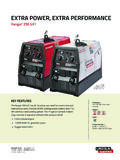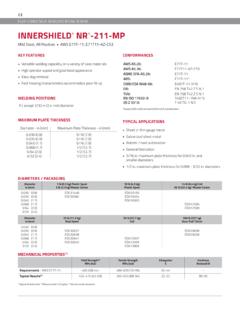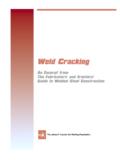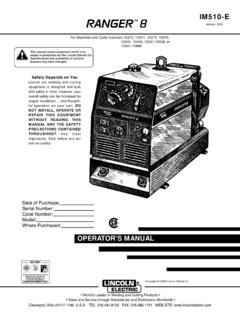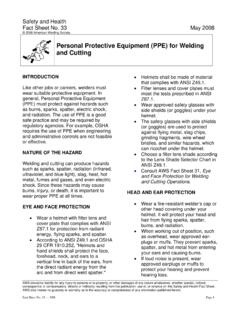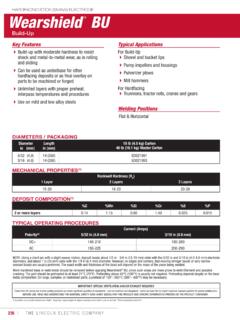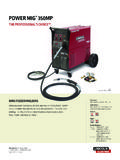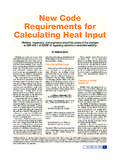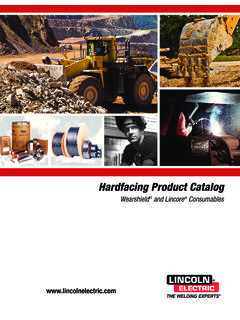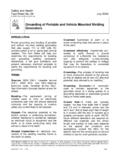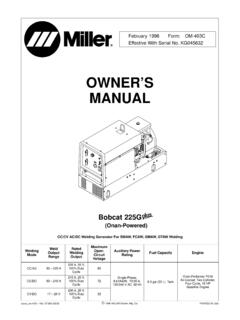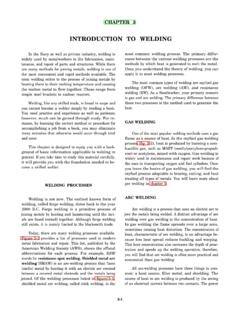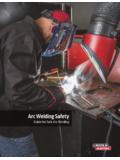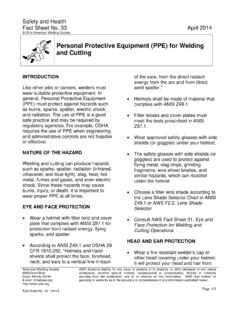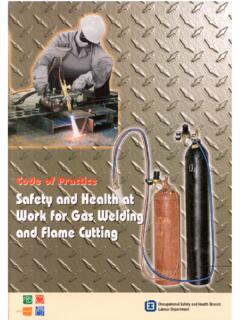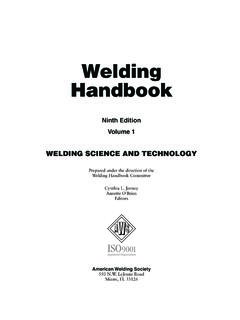Transcription of IM510-E RANGER 8 - Lincoln Electric
1 RANGER 8 OPERATOR S MANUALFor Machines with Code Numbers 10373, 10374, 10375, 10376,10535, 10536, 10537,10538, or10541,10886IM510-EJanuary, 2002 Safety Depends on YouLincoln arc welding and cuttingequipment is designed and builtwith safety in mind. However, youroverall safety can be increased byproper installation .. and thought-ful operation on your INSTALL, OPERATE ORREPAIR THIS EQUIPMENTWITHOUT READING THISMANUAL AND THE SAFETYPRECAUTIONS , mostimportantly, think before you actand be Sales and Service through Subsidiaries and Distributors Worldwide Cleveland, Ohio 44117-1199 TEL: FAX: WEB SITE: World's Leader in welding and Cutting Products Date of Purchase:Serial Number:Code Number:Model:Where Purchased.
2 Copyright 2002 Lincoln Global manual covers equipment which is no longer in production by The Lincoln Electric Co. Speci cations and availability of optional features may have ENGINE powered Turn the engine off before troubleshooting and maintenancework unless the maintenance work requires it to be Operate engines in open, well-ventilatedareas or vent the engine exhaust fumes Do not add the fuel near an open flamewelding arc or when the engine is the engine and allow it to cool beforerefueling to prevent spilled fuel from vaporiz-ing on contact with hot engine parts andigniting.
3 Do not spill fuel when filling tank. Iffuel is spilled, wipe it up and do not startengine until fumes have been all equipment safety guards, covers and devices inposition and in good hands, hair, clothing andtools away from V-belts, gears, fans and all other movingparts when starting, operating or repairing In some cases it may be necessary to remove safetyguards to perform required maintenance. Removeguards only when necessary and replace them when themaintenance requiring their removal is use the greatest care when working near Do not put your hands near the engine not attempt to override the governor oridler by pushing on the throttle control rodswhile the engine is To prevent accidentally starting gasoline engines whileturning the engine or welding generator during maintenancework, disconnect the spark plug wires.
4 Distributor cap ormagneto wire as welding CAN BE HAZARDOUS. PROTECT YOURSELF AND OTHERS FROM POSSIBLE SERIOUS INJURY OR CHILDREN AWAY. PACEMAKER WEARERS SHOULD CONSULT WITH THEIR DOCTOR BEFORE and understand the following safety highlights. For additional safety information, it is strongly recommended that youpurchase a copy of Safety in welding & Cutting - ANSI Standard from the American welding Society, Box351040, Miami, Florida 33135 or CSA Standard A Free copy of Arc welding Safety booklet E205 is availablefrom the Lincoln Electric Company, 22801 St.
5 Clair Avenue, Cleveland, Ohio SURE THAT ALL INSTALLATION, OPERATION, MAINTENANCE AND REPAIR PROCEDURES AREPERFORMED ONLY BY QUALIFIED 95 Electric AND MAGNETIC FIELDSmay be Electric current flowing through any conductor causes localized Electric and Magnetic Fields (EMF). welding current creates EMF fields around welding cables and welding fields may interfere with some pacemakers, andwelders having a pacemaker should consult their physicianbefore Exposure to EMF fields in welding may have other healtheffects which are now not All welders should use the following procedures in order tominimize exposure to EMF fields from the welding the electrode and work cables together - Securethem with tape when Never coil the electrode lead around your Do not place your body between the electrode andwork cables.
6 If the electrode cable is on your right side, the work cable should also be on your right Connect the work cable to the workpiece as close aspossible to the area being Do not work next to welding power To avoid scalding, do not remove theradiator pressure cap when the engine PROPOSITION 65 WARNINGSD iesel engine exhaust and some of its constituentsare known to the State of California to cause can-cer, birth defects, and other reproductive engine exhaust from this product containschemicals known to the State of California to causecancer, birth defects, or other reproductive RAYS can Use a shield with the proper filter and coverplates to protect your eyes from sparks andthe rays of the arc when welding or observingopen arc welding .
7 Headshield and filter lensshould conform to ANSI Z87. I suitable clothing made from durable flame-resistantmaterial to protect your skin and that of your helpers fromthe arc Protect other nearby personnel with suitable, non-flammablescreening and/or warn them not to watch the arc nor exposethemselves to the arc rays or to hot spatter or SHOCK The electrode and work (or ground) circuitsare electrically hot when the welder is not touch these hot parts with your bareskin or wet clothing. Wear dry, hole-freegloves to insulate Insulate yourself from work and ground using dry certain the insulation is large enough to cover your fullarea of physical contact with work and addition to the normal safety precautions, if weldingmust be performed under electrically hazardousconditions (in damp locations or while wearing wetclothing; on metal structures such as floors, gratings orscaffolds.)
8 When in cramped positions such as sitting,kneeling or lying, if there is a high risk of unavoidable oraccidental contact with the workpiece or ground) usethe following equipment: Semiautomatic DC Constant Voltage (Wire) Welder. DC Manual (Stick) Welder. AC Welder with Reduced Voltage In semiautomatic or automatic wire welding , the electrode,electrode reel, welding head, nozzle or semiautomaticwelding gun are also electrically hot . be sure the work cable makes a good electricalconnection with the metal being welded.
9 The connectionshould be as close as possible to the area being Ground the work or metal to be welded to a good electrical(earth) the electrode holder, work clamp, welding cable andwelding machine in good, safe operating condition. Replacedamaged Never dip the electrode in water for simultaneously touch electrically hot parts ofelectrode holders connected to two welders because voltagebetween the two can be the total of the open circuit voltageof both When working above floor level, use a safety belt to protectyourself from a fall should you get a Also see Items and AND GASEScan be may produce fumes and gaseshazardous to health.
10 Avoid breathing thesefumes and welding , keepyour head out of the fume . Use enoughventilation and/or exhaust at the arc to keepfumes and gases away from the breathing zone. Whenwelding with electrodes which require specialventilation such as stainless or hard facing (seeinstructions on container or MSDS) or on lead orcadmium plated steel and other metals or coatingswhich produce highly toxic fumes, keep exposure aslow as possible and below Threshold Limit Values (TLV)using local exhaust or mechanical ventilation. Inconfined spaces or in some circumstances, outdoors, arespirator may be required.
